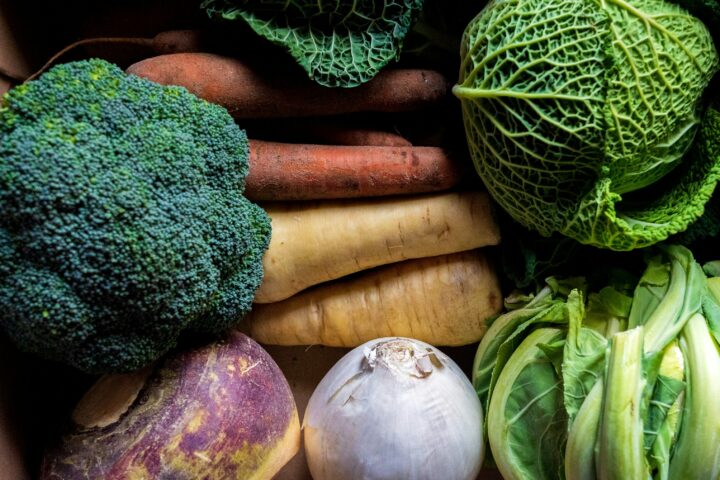 National Nutrition Month® is an annual campaign recognized in March that was established in 1973 by the Academy of Nutrition and Dietetics. It was created so people can learn about making informed food choices and develop healthful eating and physical activity habits.
National Nutrition Month® is an annual campaign recognized in March that was established in 1973 by the Academy of Nutrition and Dietetics. It was created so people can learn about making informed food choices and develop healthful eating and physical activity habits.
This year’s theme is “Food Connects Us.” According to eatright.org, “Food is a connecting factor for many of us. Food connects us to our cultures, our families, and our friends. Health, memories, traditions, seasons, and access can all impact our relationship with food. While these factors influence the foods we eat, the foods we eat also affect our health.”
When Food Is Scarce
As referenced above, access to food and good health are two of the biggest issues National Nutrition Month is trying to promote.
According to the Feeding America website, there are 963,980 people in Virginia facing hunger right now, 252,480 of which are children. In Fairfax County alone, nearly 75,000 residents are food insecure, which the U.S. Department of Agriculture (USDA) defines as “…the limited or uncertain availability of nutritionally adequate and safe foods, or a limited or uncertain ability to acquire acceptable foods in socially acceptable ways.”
This basically boils down to a situation where people don’t have enough to eat and don’t know where their next meal will come from. However, while being able to eat is one factor, it’s even more imperative for children to have sustained access to nutritious food.
Healthy Development
Nutritious food is essential for children’s healthy growth, development, and overall well-being in a number of ways:
- Physical Growth and Development. Nutritious foods provide the essential nutrients (proteins, carbohydrates, fats, vitamins, and minerals) that children need to grow and develop. The calcium and phosphorus found in dairy foods and leafy greens are vital for building strong bones and teeth. Nutrients such as vitamin A, vitamin C, and antioxidants found in fruits and vegetables contribute to healthy skin, eyes, and teeth. A balanced diet helps children maintain a healthy weight, preventing obesity and malnutrition.
- Cognitive Function and Learning. A diet rich in omega-3 fatty acids, iron, and other nutrients is essential for optimal brain development and cognitive functions like thinking, reasoning, and remembering. Proper nutrition supports better memory, attention, and focus. Nutritious meals and snacks provide sustained energy, helping children stay alert and focused throughout the day.
- Immune System Strength. A healthy diet strengthens the immune system, making children less susceptible to infections and illnesses and better equipped to recover quickly from illness.
- Long-Term Health. A healthy childhood diet can significantly reduce the risk of developing chronic diseases such as heart disease, type 2 diabetes, and some cancers later in life.
The benefits are largely the same for adults, as well. This is why organizations like Northern Virginia Family Service (NVFS) collect donations of food, money, and grocery store gift cards to provide to the people who seek assistance at the NVFS’s Hunger Resource Center (serving Prince William County), their Homeless Shelter, and their Multicultural Center.
Think Outside The Nonperishable Box
 In many cases, organizations that collect food for others are limited to canned goods and nonperishables. However, NVFS’s Hunger Resource Center (HRC) is equipped with several refrigerators, so they can accept almost any donation, including meat, dairy products from grocery and other food partners, and fresh fruits and vegetables from individuals’ gardens or grocery and food partners. It also means they can accept multi-cultural foods, in addition to gluten- and sugar-free items, as well as low-sodium foods. As anyone can imagine, this not only provides sustenance for NVFS clients, it also brings them great comfort.
In many cases, organizations that collect food for others are limited to canned goods and nonperishables. However, NVFS’s Hunger Resource Center (HRC) is equipped with several refrigerators, so they can accept almost any donation, including meat, dairy products from grocery and other food partners, and fresh fruits and vegetables from individuals’ gardens or grocery and food partners. It also means they can accept multi-cultural foods, in addition to gluten- and sugar-free items, as well as low-sodium foods. As anyone can imagine, this not only provides sustenance for NVFS clients, it also brings them great comfort.
When considering donating food and wondering what you should pick up, check with the organization you want to work with to see what their guidelines are, then think from your heart. One good anecdotal example is a young man who wanted to do his own food drive and asked guests to bring canned goods in lieu of gifts for his birthday party. His donation to the drive? Spiderman Spaghettios. It was his favorite food, and he thought if he likes it so much, some other young person probably will, too.
“That’s the perfect way to think about what to donate,” says Navara Cannon, NVFS Community and Volunteer Engagement Manager, SERVE & Greater Prince Wiliam. “There are the staples that everyone needs, but if you adopt the thoughtful mindset of ‘what would I need?’ you’re likely going to make a food connection with someone who enjoys the same things.”
One good example is coffee. It’s not on the NFVS donation wish lists, but so many people desire that quick jump start in the morning to get their day moving on the right foot.
You Can Help
 There are several ways that you can donate to NVFS’s mission and keep the spirit of National Nutrition Month going. You can send a check made out to Northern Virginia Family Service to: NVFS—Attention Finance, 3110 Fairview Park Drive, Suite 500, Falls Church, VA 22042. Please designate in the check memo area or in an attached letter to direct the funds to Family HOPE Fund (which allows NVFS to direct the donation to where it’s needed most) or to the Hunger Resource Center.
There are several ways that you can donate to NVFS’s mission and keep the spirit of National Nutrition Month going. You can send a check made out to Northern Virginia Family Service to: NVFS—Attention Finance, 3110 Fairview Park Drive, Suite 500, Falls Church, VA 22042. Please designate in the check memo area or in an attached letter to direct the funds to Family HOPE Fund (which allows NVFS to direct the donation to where it’s needed most) or to the Hunger Resource Center.
You can also donate online, where you can also find instructions on how to donate gifts of stock or grants through donor-advised funds. The HRC can purchase food from the Capital Area Food Bank for a flat fee of 19 cents per pound, meaning that a $100 donation can buy more than 500 pounds of food.
Or you can drop off donations of money, grocery or restaurant gift cards, or food at either the Hunger Resource Center or the Multicultural Center.


